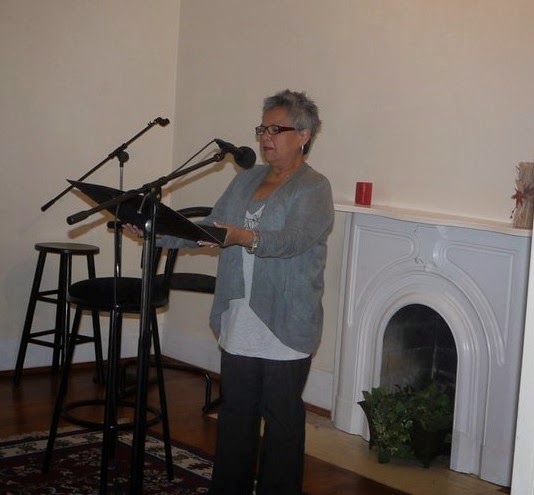 |
| Juanita Salazar Lamb at The Writers Place, Festival of Faiths |
 |
| Participants and Organizers of Festival of Faiths, The Writers Place, Kansas City, MO |
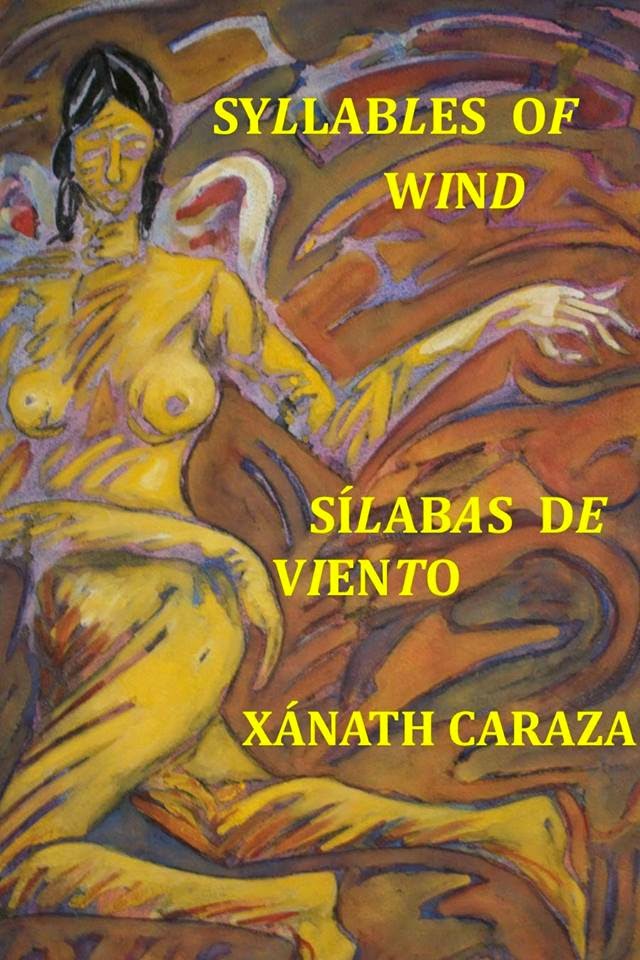 |
| Sílabas de viento/Syllables of Wind |
 |
| Juanita Salazar Lamb at The Writers Place, Festival of Faiths |
 |
| Participants and Organizers of Festival of Faiths, The Writers Place, Kansas City, MO |
 |
| Sílabas de viento/Syllables of Wind |
Review: Martín Espada. The Trouble Ball. NY: W.W. Norton, 2011.
ISBN 978-0-393-08003-2
Michael sedano
Martín Espada’s new collection, The Trouble Ball doubles a reader’s pleasure with two parts. The second section, Blasphemy, comes with ten poems, the title section fourteen. Adding a soupçon more, the poet adds a notes section to fill in allusions and inform personages for eighteen of the twentyfour...one searches for the mot juste to encompass the experience of reading this most recent publication of America’s best English-language poet.
Diversity is too trite a term, but here is a diverse collection. Humor; eulogy; polemic; prayer. Each of the 24 pieces has its own beauties, some sizzle with passion that makes the others fade from memory. As it should be.
Masterpiece similarly suffers from overuse, like standing ovations at the Phil. The Trouble Ball floats a few masterpieces that will sustain the poet’s reputation as the best American poet writing in English. Like Dudamel at every concert, Espada once again earns his ovation with this diverse collection of masterpieces and pieces.
The title poem starts out as one of those evocative baseball panegyrics in the ilk of “Casey at the Bat,” “Take Me Out To The Ball Game,” “The Boys of Summer.” The poem is dedicated to the poet’s father, Frank Espada, the boy in the poem. The reader is prepared for simple and warm emotions. The reader prepares to endure nostalgia for old-time legends of the sport, the Brooklyn Dodgers, a father takes his boy to Ebbets Field.
In its first three stanzas nostalgia gives way to understated anger explaining the brutal moment a little boy learns segregation and how to fit in: baseball kept black players out of the spotlight and the money in 1941, no los dejan, the poet’s grandfather explains sotto voce so their language doesn’t give them away to the social myopia of this blindly complicit mob.
Readers will follow the next five stanzas with interest as the poet turns the lens back on himself. What’s Espada going to do with this now?
Blasphemy--speaking impiously—comes naturally to some poets. Chicana Chicano, Puerto Rican poets cut their teeth goring sacred cows, so Blasphemy as the title of a section in a poetry collection implies much beyond the hieratic. For some poems in this Part Two, humor motivates, for others, death itself becomes the point of the joke.
The title piece comes second in its section. An eight line gem, its blasphemy comes with a smile, “poetry can save us” and “not the way Jesus, between screams, / promised” and its ultimate irony, poetry can save some of us.
Today we feature a guest post from our friend from the Latino Writers Collective, Xánath Caraza, reporting on Luis Rodriguez's recent visit. But before we get to that, I have to tell you about a series of archived short films featuring interviews with several Tejano writers, musicians, and artists. The films are part of an oral history project of the University of Texas at Brownsville and Texas Southmost College. Rolando Hinojosa sent me the information about these films and now I pass on that same info to you.
The Los del Valle Oral History Project, begun in 1993, includes edited autobiographical sketches of people from the Rio Grande Valley and South Texas and accounts of historical and cultural events that document the rich heritage of the area. The twenty one volume series includes personal interviews, photographs, film clips and music that convey the uniqueness of the area not usually found in traditional sources.

 about the past,' he said, 'Let’s be realistic. You and I are alone. These stories don’t matter to anyone anymore.'” The irony is how vitally important “these stories” remain in today’s repression-minded times. That the subject is repression against Nazis is but an added irony.
about the past,' he said, 'Let’s be realistic. You and I are alone. These stories don’t matter to anyone anymore.'” The irony is how vitally important “these stories” remain in today’s repression-minded times. That the subject is repression against Nazis is but an added irony.
Latino Writers Collective. Cuentos Del Centro. Stories From The Latino Heartland. Scapegoat Press, Kansas City MO, 2009.
ISBN 13: 978-0-9791291-2-4
Michael Sedano
Among the diverse pleasures of writing regular book reviews is the chance to discover the work of small press enterprises such as Scapegoat Press out of Kansas City, Missouri. My usual fare comes from big publishing concerns out of New York or other metropolises, and what serendipity brings me off the New Books shelves of the Pasadena Public Library. There's a lot to be said for the output from well-funded ventures, editors, and agents. Quality, however, is not exclusive to the big bucks process. Case in point, Kansas City's Latino Writers Collective and its recent anthology of local writers, Cuentos Del Centro.
Cuentros Del Centro features twenty-four stories from fifteen writers. Three of the stories, by Xánath Caraza, come in Spanish, the others más o menos puro Inglés. Caraza translates hers into English--or is it the other way around? The English language versions come to you smoothly, absent the cultural lacunae found in some translated work, as if the writer works in English then converts to Castellano. Language students will enjoy the simultaneously translated work as a way to challenge their eye and ear for the one or the other idioma. More interesting, especially in the writer's first two pairs of stories, is her surrealist bent. "Scofield 207"--same title in both languages--sees a schoolteacher lose her identity to the glyphs on a page when her ink pen takes over from her hand. "I was the character of the story; that was my hand. I did not exist there, outside. I now only existed on paper. I had been born with that story and now it was time to go back home." In this ultimate of pathetic fallacy, the story ends with the beautiful metaphor of being swallowed by one's work, "the arrival of the white night."
Latino writing, from wherever it emanates, will share experiences, such as the child farmworkers of Miguel M. Morales' "Hijo con Filo", or the lovely irony fashioned around a rural quinceañera in Juanita Salazar Lamb's "El Vestido Colora'o." The hot sun, chorizo and egg tacos, getting cropdusted by asshole farmers could happen in a peach orchard in Bakersfield Califas as in Under the Feet of Jesus, or the soybean field of the boy with a hoe. "The Farmhouse," on the other hand, captures the relentless fear that grips a picnicking familia unwisely trying to outrun weather unique to the heartland--a threatened tornado and killer hail. Nor is the racism of an anglo farmer something unique to Kingman County, Kansas, but when it drives the gente back into the maw of the storm, Morales gives the commonplace its uniquely local color.
It is the heartland also that helps these writers avoid a pet peeve of mine, appositional translation. Writing a Spanish phrase, immediately translating it into English. The technique, perhaps an editor's pique, conveys an artificiality to a story that is tough to overcome. Cuentos Del Centro's characters, and titles, use Spanish sparingly, avoid translation, or do so skilfully. A masterful instance comes in "El Regreso." The whole of José Faus' story translates that. A worker on este lado reminisces in a sentimental funk about the day he left, about his children calling him papá and expressing their love, despite their being too young to remember him at all. The man has been a success en el Norte because he is an honorable person, not "a thief, a ladron" (no italics). Plus, "His English gives him an edge over the others that refuse to learn it or choose not to speak, fearing how they sound." He's earning good money cooking his mother's recipes, but toned down to the local tastebuds. So back home he regresars. He kisses the wife who makes him promise never to leave again. "'I won't,' he whispers back and whispers it again and again throughout the day and night and the many years that follow." And that is what "El Regreso" means in English.
It is a pleasure for this Bloguero to connect with an old blogfriend, Juanita Salazar Lamb, who back in 2008 was a La Bloga guest Bloguera. Juanita is one of those Spanish-language sans translation writers who trusts her readers, so she lets the speeches stand on their own, or skilfully does the English in effective context:
"'Entonces, conoces nuevas amigas, y ¿cómo sabes? En tu vestido nuevo te vas a ver tan bonita, que todos van a querer bailar contigo.'
I gave her the look that spoke what I didn't dare say to my mom, 'What planet are you from? Girls like me don't get asked to dance.'
'Alístate antes que le diga a tu papá.'
The threat that always brought me back to my sense--my mom would tell my dad."
Lamb's story of the red dress will bring a smile to your face, even though the ironic finis is predictable. It's a happy ending that a decent child deserves.
Speaking of happy endings, I wish the Latino Writers Collective had wrapped up its outstanding set with Gloria Martinez Adams' "The Wager." Here is a brilliantly romantic story--genuine love growing old together--that offers sweet contrast to the crappy treatment women receive from worthless men in the anthology's closing offering, Linda Rodriguez' "Why I Can't Draw." Rodriguez' capstone, at least, closes with a note of hopefulness borne of self-reliance, and that's a good thing, exactly as the self-reliance of this writers collective from the Unitedstatesian heartland proves valuable to readers of Chicana Chicano Latina Latino writing.
You can read these stories only if you can get your hands on a copy of the book. Your independent bookseller can order it, or you can email the collective at [email protected]. Unfortunately, the URL for the collective either is broken or lapsed, another hazard of the indie press, I suppose. Ni modo. You owe yourself and friends the opportunity to enjoy these stories and writers. Click, buy, read. You are welcome de antemano.
PALABRA @ The REDCAT Lounge presents(Press release text follows)
William Archila reading from his debut book of poetry THE ART OF EXILE Sunday, July 26 at 3:00 pm
In a powerful collection of poetry, poet William Archila takes the reader on a poignant emigrant's journey from the war-ravaged El Salvador of the 1980s to Los Angeles. The poet's grief is unapologetically set before us in clear yet lyrical terms. The art of his voice compels the reader to acknowledge the brutality of war and the struggle of the disenfranchised. The sense of loss is palpable, but so are tenderness, humor and love.
". . . William Archila is the reigning master of some breathtaking imagery that encompasses a practiced, lyrical certainty. There's a deep singing at the center of Archila's world, a calling to everything that says home is where the heart is." —Yusef Komunyakaa, Pulitzer Prize winner
"[Archila's] voice is not only an important addition to the chorus of Latino/a poetry, but a necessary one in the vast landscape of belles lettres in the United States. To say he sings like an angel is an understatement. He is possessed of brilliance and what Lorca called `duende.' The Art of Exile joins the ranks of the best poetry published this year." —Virgil Suárez, author of 90 Miles: Selected and New(2005)
William Archila holds an MFA in poetry from the University of Oregon. His poems have appeared in The Georgia Review, AGNl, Poetry International, The Los Angeles Review, North American Review, Obsidian III, Notre Dame Review, Puerto del Sol, Rattle andBlue Mesa Review, among others.
The REDCAT Lounge
631 W. 2nd Street (@ Hope)
Los Angeles, CA 90012
(in the Walt Disney Concert Hall complex)
Contact: elena minor • [email protected] • 1 800 282 5608
PALABRA @ The REDCAT Lounge is a new series of occasional readings presented by PALABRA A Magazine of Chicano & Latino Literary Art. Website: www.palabralitmag.com
And that's the first Tuesday of the seventh month of the year 2009. A Tuesday like any other Tuesday, except You Are Here. Thank you for visiting La Bloga.
La Bloga welcomes your comments on this and any daily column. Just click on the comments counter below to update information, reflect on something, or add your most welcome views.
La Bloga welcomes guest columnists. It's a pleasure to welcome Lydia Gil, a former Guest Bloguera, as a new member of La Bloga's daily team. Lydia and Lisa Alvarado will share Thursday columns. If you'd like to be our guest, click here and let us know your column idea.
Here's hoping we all feel independent. The answer to last week's query, "How many other nations have a fourth of July?" is All of them.
hay les wachamos.
atentamente,
mvs
Review: Primera Pagina. Poetry from the Latino Heartland.
Kansas City, MO: 2008
ISBN 978-0-9791291-1-7
Michael Sedano
A few weeks ago, at the National Latino Writers Conference, I had the pleasure of hearing several of the women read their work included in this welcome anthology coming to us out of Kansas City, Missouri. These are effective, competent voices that fit well into the encompassing genre of "Chicana Chicano" arts.
"Latino" in the subtitle lets the collection cover a lot of ground, but principally this collection features Chicana Chicano poets. Which is to say, the poems reflect many of the themes and images that have populated poesía chicana over the years.
Among the preponderant themes echoed in this collection is the "lost and ruined homeland" that evokes places like barrios or Aztlán. Here, the subtitle, "from the Latino Heartland" places all the works into that geographic perspective. We may write in Kansas, the theme suggests, but we're from someplace else, the same place as the rest of you, the rest of us.
One expression of place is Gabriela N. Lemmons' "Kansas," where the poet declares, "I know when they harvest winter wheat,/ when corn needs to be planted, and how/ close to God people think they are. / But I don't know one multi-tongued latino, / where I can buy pumpkin empanadas, / dulce de leche and De La Rosa Mazapán. / Whether La Llorona roams in white or black /in these parts and what creeks she frequents? / I cannot remember how/ a wetback smells anymore, / soon after he crosses el Río Grande-- / the vein of my roots meandering / in hues of azul."
Lemmons adopts a tactic of footnoting all her Spanish phrases for the English-only reader. Empanadas (italicized in the note, not in the poem) are pies; dulce de leche is caramel; mazapan (sans diacritic) is peanut butter candy; La Llorona is the legendary wailing woman (Mexican Tale); azul is blue.
Another commonly read theme, the Anglo as devil, the exploitation of gente by officialdom, comes in for an interesting twist in Chato Villalobos' "Brown Eyes in Blue". The twist is the poet writes in the voice of a police officer who believes his presence brings security and justice to his pueblo. Aware of the contradiction, the poet writes, "I hesitate before looking in the mirror / That's when visions of Malinche appear / Because nothing really looks out of place / Until I see the brown skin of my own face." Pride of position overcomes fear of contradiction as the poem resolves with the thought, "The barrio calls for me I can't refuse / 'Cause I know they'll be safe with brown eyes in blues."
Not every writer attempts to put an ethnic or cultural gloss on their work. For instance, José Faus' work covers 28 pages of work that defies its placement in a "Latina Latino" collection. In contrast, Xánath Caraza writes facing-page bilingual poems. Speaking of language, English is the mode of expression for these pages.
Primera Página is a delightful collection of relatively new voices--the opening poet is San Diego's Taco Shop Poet, Tomas Riley. Aside from the pleasure of finding promising new poets, I found an excellent approach to these poets is reading the women first, then the men. An opportunity for dialog emerges from this approach. Some women expose the brutality of abusive men, as when Linda Rodriguez' "P.O.W." recounts the savagery of sexual abuse of a 9-year old girl by her father. The men are oblivious to these charges. To them, women are objects for play and seduction, as in Andrés Rodriguez' "Chronicle of a Salvadorian Girl," whose saving grace is the man and woman are clueless together. I would think the follow-up volume will bring these disparate points of view into confrontation. Since the anthology is product of a collective, I hope they'll do this and let us see what emerges.
One Bit: Printmaking and BBQ in Highland Parque.
Grand Opening
Sunday, June 22, 2008 @ 5:00 pm
Sonia Romero’s Printmaking Studio
Museum of Traffic, LLC
and
Launching of community partner LACommons’s website (www.lacommons.org)
Sunday, June 22, 2008 starting at 5:00 pm
Please join us for a barbeque/barbacoa afternoon as we celebrate the new at the Avenue 50 Studio
Food ~ Music ~ Art
Plus, a demonstration of printmaking by Sonia Romero
We invite you to join us and bring a refreshment or food in celebration
Avenue 50 Studio(s), Inc.
131-135 No. Avenue 50
Highland Park, CA
90042
323/258-1435
Bit Two: Latinos in Lotusland reading and book signing. Among the major independent booksellers on the eastside of the Los Angeles basin is Vroman's, in Pasadena. The two locations don't stock a lot of Chicana Chicano literature, so it was a pleasant surprise to read that the store was to host an evening of writers featured in the Daniel Olivas-edited anthology.
Among the major independent booksellers on the eastside of the Los Angeles basin is Vroman's, in Pasadena. The two locations don't stock a lot of Chicana Chicano literature, so it was a pleasant surprise to read that the store was to host an evening of writers featured in the Daniel Olivas-edited anthology.
It was a pleasantly full house of readers and writers who attended to enjoy some stimulating presentations. Most encouraging was the energetic jostle after the readings and Q&A. Vroman's must have sold a goodly number of the increasingly popular title. I hope the attendance and sales persuade Vroman's to host more Chicana Chicano Latina Latino writers.
Sandra Ramos O’Briant. Lana Turner Slept Here.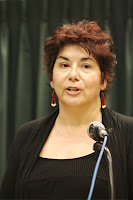 O'Briant clearly practiced her reading, plus she's an effective reader. But beyond that, O'Briant went to the extra effort to pare her story down to what she felt was a manageable time, and read from a typescript rather than the book. Two strangers in a chance encounter share painful marriage stories and learn that caring for others has a price, and it's probably worth it.
O'Briant clearly practiced her reading, plus she's an effective reader. But beyond that, O'Briant went to the extra effort to pare her story down to what she felt was a manageable time, and read from a typescript rather than the book. Two strangers in a chance encounter share painful marriage stories and learn that caring for others has a price, and it's probably worth it.
Victorio Barragán. Daylight Dreams.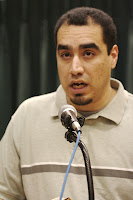 Barragan shared his first published work, a tale of bitter irony and crashing expectations. A shy man has admired a cute woman who rides his bus. He's worked up a romantic fantasy about the stranger. Today he will talk to her. In his dreams she will instantly respond and a long, happy relationship will come of it. Dashed. A slick jerk steals his woman from him and the bus pulls away with the woman happily flirting with the other guy. Carpe diem, loverboy.
Barragan shared his first published work, a tale of bitter irony and crashing expectations. A shy man has admired a cute woman who rides his bus. He's worked up a romantic fantasy about the stranger. Today he will talk to her. In his dreams she will instantly respond and a long, happy relationship will come of it. Dashed. A slick jerk steals his woman from him and the bus pulls away with the woman happily flirting with the other guy. Carpe diem, loverboy.
Conrad Romo. The Cement God. Romo's powerful voice enhances this gem of a boy-fatherhood story. Capturing small details of a boy's front stoop conversation with his grandfather, a master cement finisher, the tale sparkles with genuine warmth. The story favorably evokes the powerful cement-pouring scene from Richard Vasquez' novel, Chicano. In fact, Olivas has included that scene as the final entry of the anthology.
Romo's powerful voice enhances this gem of a boy-fatherhood story. Capturing small details of a boy's front stoop conversation with his grandfather, a master cement finisher, the tale sparkles with genuine warmth. The story favorably evokes the powerful cement-pouring scene from Richard Vasquez' novel, Chicano. In fact, Olivas has included that scene as the final entry of the anthology.
Lisa Alvarez. Sweet Time. Alvarez' mother-daughter-stepsister story carries the tension of a mother's final stay in the hospital. The writer successfully conveys the distance that grows between families split apart by serial monogamy and alcoholism. Alvarez' dry humor gives the story added zest, transforming what could be a dreary tale of regret into something positive.
Alvarez' mother-daughter-stepsister story carries the tension of a mother's final stay in the hospital. The writer successfully conveys the distance that grows between families split apart by serial monogamy and alcoholism. Alvarez' dry humor gives the story added zest, transforming what could be a dreary tale of regret into something positive.
Daniel Olivas. Bender.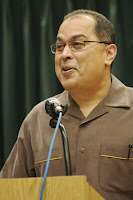 Olivas' metaphorical critter story has a lot of sexuality packed into such a tight space. Reprinted from his collection Devil Talk, it's a gem of perplexity that will have readers going back to page one to reassure themselves they've grasped what the writer told them. "Bender," as the other stories read that evening, is a delight.
Olivas' metaphorical critter story has a lot of sexuality packed into such a tight space. Reprinted from his collection Devil Talk, it's a gem of perplexity that will have readers going back to page one to reassure themselves they've grasped what the writer told them. "Bender," as the other stories read that evening, is a delight.
I'd like to encourage authors to develop fuller eye contact with the house. O'Briant's strategy of practicing and using a typescript allow her the luxury of pulling eyes off the page and looking out at her listeners. Too often a reader briefly glances up--I wonder if they even see what's before them--then glues the eyes to the page. Lecterns are unfriendly instruments. The slanted desktop makes it difficult to display the book. Any photo of an author reading will benefit from including the cover in the shot.
A Sadness in This Piece.
This email comes from Oscar Garza, Editor In Chief of Tu Ciudad Magazine.
Friends, sorry for the mass e-mail, but I have a lot of people to reach out to. If you have the June/July issue of Tu Ciudad—our third anniversary issue—hang on to it: it's the last one that will be published. Last Thursday, Emmis Communications announced that it is "suspending" publication of the magazine, which means that they're pulling the plug. Emmis is not to be blamed because, in fact, the company went far beyond the financial commitment they originally made to Ciudad. We simply couldn't sell enough advertising to succeed. For the past 14 months our Founder/Publisher, Jaime Gamboa, has been seeking additional investors, but his efforts—which continued even until last week—have been unsuccessful.
The media business is undergoing a revolution. Print, in particular, is in trouble (e.g., Los Angeles Times). The notion of killing trees to print words and pictures is increasingly archaic and expensive—as is the cost of mailing a magazine, which we were doing (for free) to 85,000 households.
That said, I am proud of what we produced at Ciudad and for the contribution we made to Latino cultural history. The most common response I heard from readers was: "Finally! I've been waiting for a magazine like this for a long time." And it was especially touching and bittersweet to hear such sentiments during the past few weeks while knowing that our possible demise was imminent.
My own future is undetermined at the moment. I have a few options and I'll let you know where I land. (This e-mail address will be operable until June 20. After that you can reach me at: [email protected].) But the first thing I'm going to do is wean myself off Tylenol PM, which I got hooked on to combat sleepness nights of magazine-related worry. (Maybe you'll see me on VH1’s “Celebrity Rehab.”)
One of my favorite magazines is No Depression, which celebrates all styles of American roots music. Coincidentally, it just published its final issue—a victim of two industries that are in flux. That magazine took its title from the Carter Family song, "No Depression in Heaven." And I too will take my cue from the song: there's no depression in the closing of Ciudad, only pride and gratitude.
Thanks to all of you for being loyal readers and supporters.
That's it for June's third Tuesday. Next week, I'll be looking at Akashic's Trinidad Noir, another in the publisher's growing noir series. So far, so good, but then, I've just started it.
ate,
mvs
La Bloga welcomes your comments on today's or any post. Simply click the "comments" counter below. La Bloga invites guest columnists. Haz klick aquí to declare your interest in sharing a review, an extended comment, an arts or culture event, or something of note.
Two very different author events coming up in June at the Tattered Cover. They each sound intriguing but I admit I'm drawn to 6 Sick Hipsters. Here are the book store announcements.
GIRLS RULE! DENISE VEGA, LYNDA SANDOVAL, TERRI CLARK
Time: Saturday, June 21, 2008 7:00 p.m.
Location: Tattered Cover Colfax Avenue, Denver As part of Booked, a new series of interactive events for young readers, three local authors will discuss and sign their new books for teens. Denise Vega will present her book Fact of Life #31 (Random House), and Lynda Sandoval and Terri Clark will discuss their new book Breaking Up is Hard to Do (Houghton Mifflin). This will not be your ordinary panel discussion. It will be three of our favorite authors with their guards down, taking questions, reading, offering a playlist for one of the books, and more!
As part of Booked, a new series of interactive events for young readers, three local authors will discuss and sign their new books for teens. Denise Vega will present her book Fact of Life #31 (Random House), and Lynda Sandoval and Terri Clark will discuss their new book Breaking Up is Hard to Do (Houghton Mifflin). This will not be your ordinary panel discussion. It will be three of our favorite authors with their guards down, taking questions, reading, offering a playlist for one of the books, and more!
Request a signed copy: [email protected]
RAYO CASABLANCA - 6 SICK HIPSTERS
Time: Friday, June 27, 2008 7:30 p.m.
Location: Tattered Cover Historic LoDo
 Denver author Rayo Casablanca is a film and music critic who has contributed short fiction and pop culture criticism to McSweeney's Internet Tendency, Geek Monthly, Splendid and Juked among others. In the late '90s Rayo self-published Sinema Brut, a critically acclaimed 'zine devoted to European Trash Cinema. Casablanca will read from and sign his debut novel 6 Sick Hipsters (Kensington), a hilarious, frenetic, adrenalin-charged murder mystery, that does for modern day Williamsburg, Brooklyn, what Bret Easton Ellis's Less than Zero did for '80s L.A. - but with a knowing grin and a far cooler soundtrack.
Denver author Rayo Casablanca is a film and music critic who has contributed short fiction and pop culture criticism to McSweeney's Internet Tendency, Geek Monthly, Splendid and Juked among others. In the late '90s Rayo self-published Sinema Brut, a critically acclaimed 'zine devoted to European Trash Cinema. Casablanca will read from and sign his debut novel 6 Sick Hipsters (Kensington), a hilarious, frenetic, adrenalin-charged murder mystery, that does for modern day Williamsburg, Brooklyn, what Bret Easton Ellis's Less than Zero did for '80s L.A. - but with a knowing grin and a far cooler soundtrack.Request a signed copy: [email protected]
WHEN PIGS FLY, MEN HAVE BABIES, AND PEACE AND JUSTICE RULE THE WORLD
I got your site from another site and I am happy to get it as you have really well maintained blog here and I really liked your posts.
I was very impressed with Luis's presentation on the 29th. I really loved how he spent so much time addressing the questions of the crowd and not just saving all of the time to talk about his books. He talked about so many pertinent issues with today's youth. What he is doing for communities especially in California is very honorable. After listening to this lecture I can't wait to read one of his books!
Xánath's post about Luis's visit to KC right on targeting Luis's keen observations and recommendations for youth to connect with their passion and their art (whatever that art may be). We were all impressed by Luis's unassuming brilliance.
Thanks to all for the tremendous feature on Luis today! His organization deserves all and more...
'brazos Luis y todos,
Gloria Martinez Adams
Luis' talk was captivating. His use of imagery to capture the essence of the poem's subject is unrivaled.
The way Luiz openly shared his life's story was amazing. Despite all of the bad decisions he had made throughout his life, both dangerous and illegal, he has still managed to turn his life around. In his struggle to leave 'the vida loca' Luis was able to overcome addiction, poverty, violence and gang life. He is an inspiration to anyone going through a rough time in their life. It is never too late to make a change in your life.
Thank your for sharing the experience of Luis J Rodriguez for those of us who could not attend. Adelante, LWC! -- Juanita
Thank you all for you comments. It's a pleasure and an honor to publish these words in La Bloga.
Peace,
Xánath Caraza
My name is Romney Hartsfield. I was thoroughly impressed by Mr. Rodriguez's poems he shared. Being that english was not his primary languageand the fact that he was involved in a gang made me even more excited about reading his book. So I bought the book and read it over the weekend. The book was quite entertaining and informative. I look forward to future readings from him.